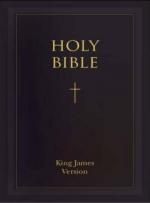|
|
King James Bible - Old Testament Author/Context
The King James' Bible is an English translation of the Bible from the original languages, including Aramaic, Hebrew and Greek. The Old Testament originally existed as an oral tradition. The dates for the first written copy of this tradition are constantly debated. The written text had gone through several revisions by the accepted date of the birth of Jesus Christ (1 Common Era). The New Testament was composed in the decades and centuries following the death of Christ and the rise of the new Christian Church. With the stratification of the Church, the Bible became more uniform, yet there were always books whose origin and authenticity were called into question.
From the split of Christianity into the Roman Catholic and Greek Orthodox traditions, versions of the Bible were polarized along Latin and Greek lines. In Europe, the Latin Vulgate, prepared originally in the 4th century by St. Jerome was the universal edition. This edition was used by the Catholic Church as the basis of religious and philosophical praise to the Deity. It was not until the Protestant Reformation that translations became common. Martin Luther made one of the first translations into German. In Switzerland, Calvinists, an early Protestant sect, made the first widely read English translation of the Bible.
England did not follow Germany into the Reformation. Henry VIII, in order to secure a divorce, ceded from the Catholic Church and made himself the head of the Anglican Church, or the Church of England. Since theology was not his main concern, this early version of the church did not stray much from Roman Catholicism. Subsequent rulers, however, made more of an impact on the Church. Queen Elizabeth helped solidify the dogma of this institution with a series of laws and proclamations. When Queen Elizabeth died in 1603, her nephew, James VI of Scotland became James I of England. Although derided for his sickly physical attributes, James became renowned as a 'scholar-king.' He knew Greek, Latin and French and was very concerned with theological debate.
The Puritans were the strongest religious force in England beside the church itself. For years they had embraced the Geneve bible as a translation. When James I suggested that a translation may be in order, it was embraced by John Rainolds, a Puritan leader. In 1604, James' aides began gathering scholars to work on this translation. About fifty scholars worked for the next 5 years. Unlike other translations at the time, this was made from the original tongues rather than St. Jerome's Latin Vulgate. The translations were worked together and edited for uniformity. It was published in 1610/11 with a lengthy dedication to the King of England and God.
The influence of this translation has been far-reaching. Prior to its conception, Christianity was primarily locked away in dead languages. The common people had little access to the document that was the cornerstone of their religious belief. An array of the most able scholars and poets of the time made the translation. From its inception, the King James' Bible was intended to be a masterpiece. It has influenced generations of English speaking peoples from commoners to scholars to kings. Perhaps this is why Cleland Boyd McAffee calls it the "Greatest English Classic."
Bibliography
Goodspeed, Edgar J. How Came the Bible. Abingdon Press, New York: 1940.
The Holy Bible, King James Version. Ballantine Books, New York: 1991.
McAffee, Cleland Boyd. The Greatest English Classic. Harper and Brothers, New York: 1912.
Opfell, Olga S. The King James Bible Translators. McFarland, London. 1912.
Paine, Gustavus, S. The Learned Men. Thomas Y. Crowell Company: 1834.




